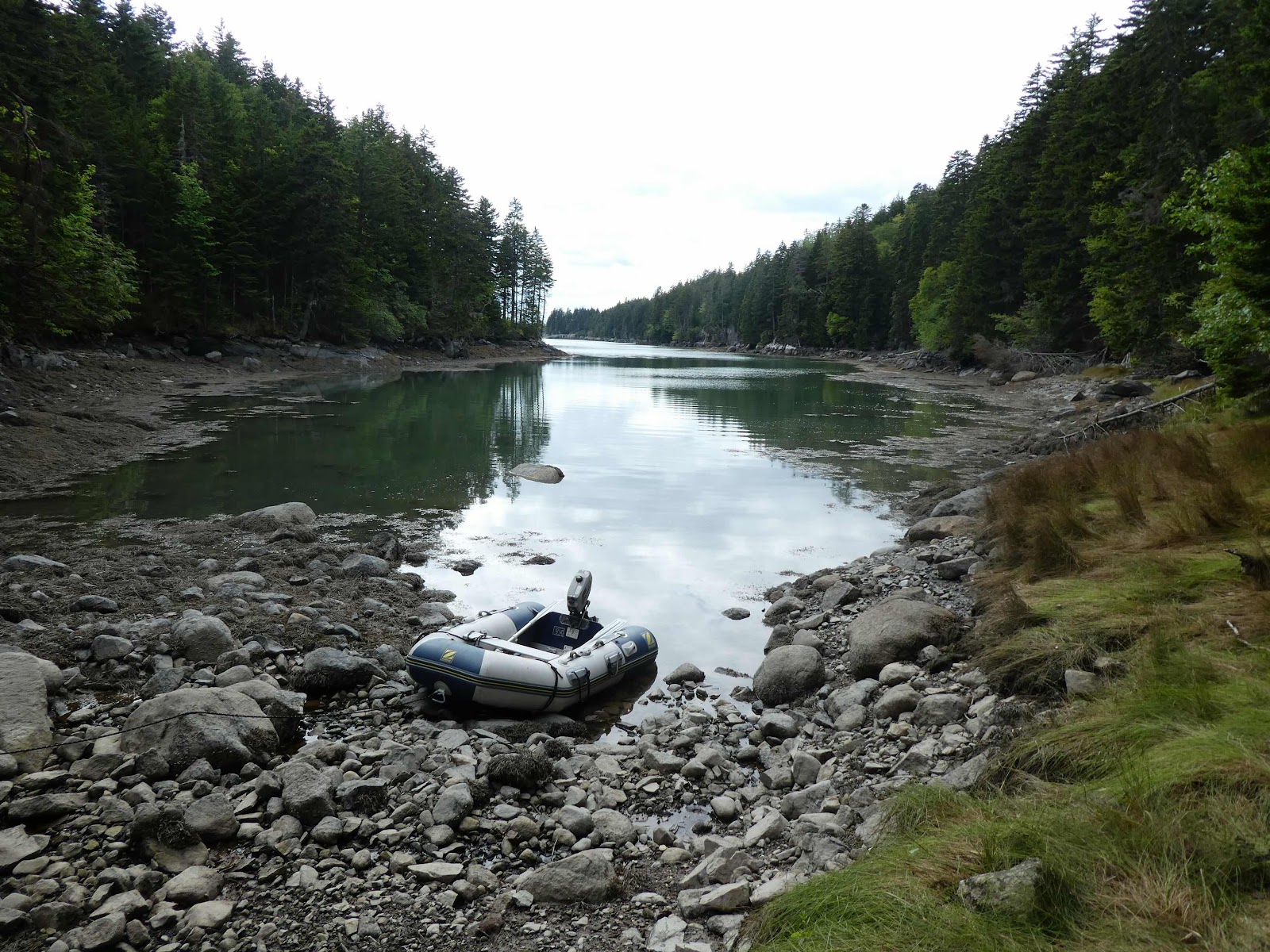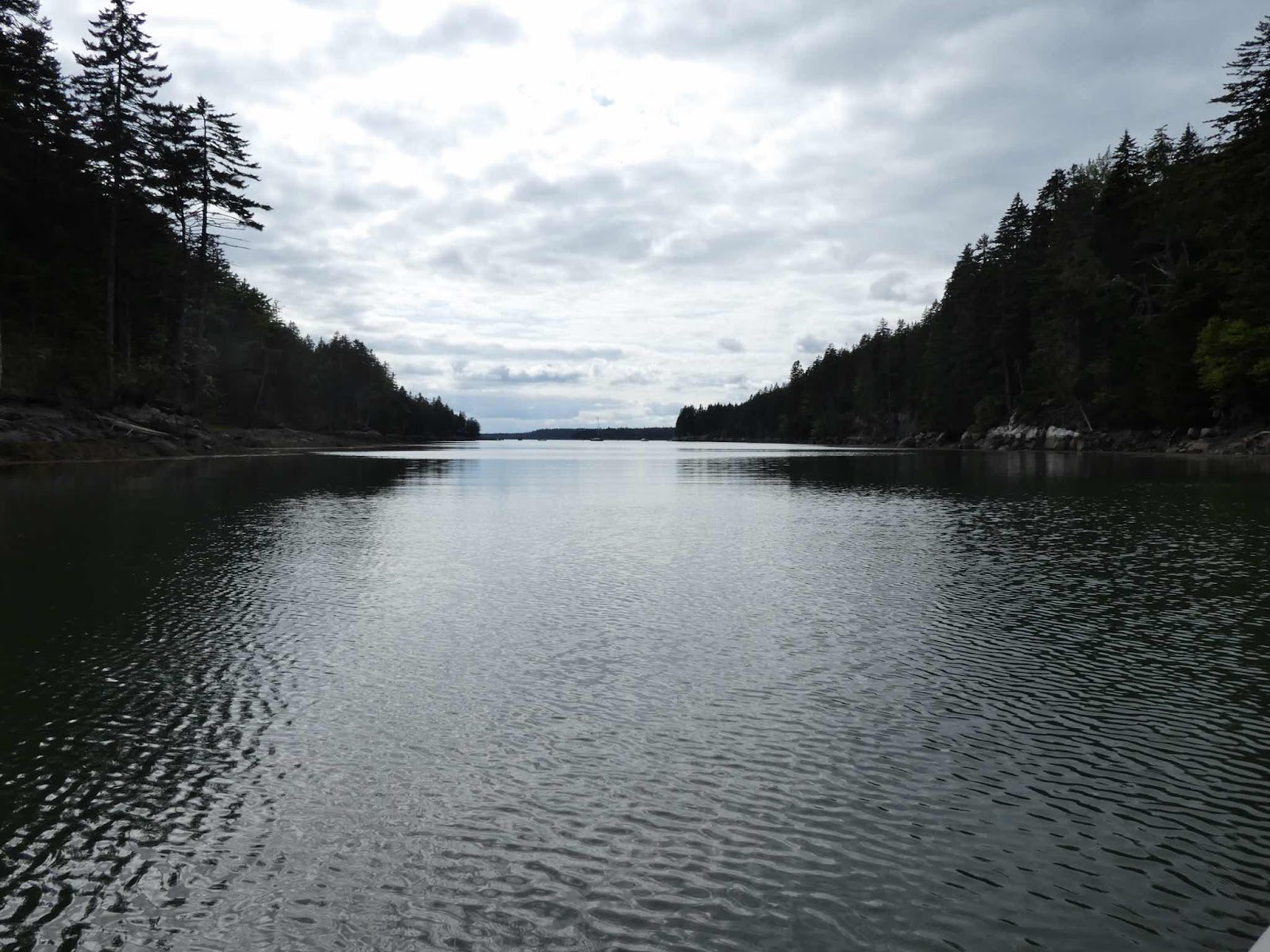Having read that bald eagles frequent Pleasant Bay, which would be a one-day deviation from our planned passage west, and knowing that there is an OCC mooring available in Ports Harbour almost at the head of Pleasant Bay, we made this very pleasant detour to see if we could find both the birds and the mooring. Definitely there would be no eagles further west, and the crew was desirous of having the opportunity to see these magnificent birds if possible.
Four hours after weighing anchor at Mistake Island on 24 August, Follyfin was settled on the ‘John White’ OCC mooring, located all on its own in the perfect little cove that is Ports Harbour. We were told later by the kind owners of the mooring and of John White Island that Follyfin was only the second OCC boat to use the mooring this season, and the first sailing vessel. This was all too apparent from the amount of weed on the buoy’s line and some very strange little creatures living on it. They are reminiscent of stick insects but these are aquatic ones!
 After lunch we embarked in the dinghy to explore further into the harbour. As we set off, the aforementioned owners of the mooring appeared on their float and we made ourselves known. Diane and Jack Myles imparted some history of the island and invited us for ‘happy hour’ later at their house on the island. Apparently Ports Harbour was originally more romantically named ‘Poets’ Harbour, after a literary visitor in the late 19th century inscribed some verses on a rock at the head of the harbour. Some time later, when the official chart makers came and asked the local fishermen what this place was called, they misheard the word ‘poets’ and named it ‘ports’ instead. Of course we had to go in search of this rock. A tranquil dinghy ride took us to the head of the harbour, during which several banded kingfishers, a pair of bald eagles and lone sandpipers were spotted. Dinghy was beached and we set off along the overgrown path through the forest in search of the engraved rock.
After lunch we embarked in the dinghy to explore further into the harbour. As we set off, the aforementioned owners of the mooring appeared on their float and we made ourselves known. Diane and Jack Myles imparted some history of the island and invited us for ‘happy hour’ later at their house on the island. Apparently Ports Harbour was originally more romantically named ‘Poets’ Harbour, after a literary visitor in the late 19th century inscribed some verses on a rock at the head of the harbour. Some time later, when the official chart makers came and asked the local fishermen what this place was called, they misheard the word ‘poets’ and named it ‘ports’ instead. Of course we had to go in search of this rock. A tranquil dinghy ride took us to the head of the harbour, during which several banded kingfishers, a pair of bald eagles and lone sandpipers were spotted. Dinghy was beached and we set off along the overgrown path through the forest in search of the engraved rock.

We had not bargained with the onslaught from vicious mosquitoes lurking in the woods. Clearly they had been starved of human blood for a very long time... We persevered for a while but eventually admitted defeat. Heading back out from the harbour, Follyfin could be seen, serene at the entrance and mosquito-free.
 At Diane and Jack’s beautiful house - with a view to die for out over Pleasant Bay - we met their neighbours and enjoyed delicious appetisers and wine. They also had a most interesting framed poster showing all the different types of lobster pot used in Pleasant Bay. The photo below was kindly supplied by Diane a few days later...
At Diane and Jack’s beautiful house - with a view to die for out over Pleasant Bay - we met their neighbours and enjoyed delicious appetisers and wine. They also had a most interesting framed poster showing all the different types of lobster pot used in Pleasant Bay. The photo below was kindly supplied by Diane a few days later...
 Now dear reader, one of the most feared occurrences for a sailing boat is to get a rope accidentally wrapped around its propeller or rudder, let alone a rope that is attached to a lobster pot weighing at least half a hundredweight that is sitting on the sea floor. So one of the main duties of the watch keeper on passage is to ensure that the boat does not run over one of these lobster pots; when there are so many, watch-keeping can be very tiring and a bit of a nightmare.
Now dear reader, one of the most feared occurrences for a sailing boat is to get a rope accidentally wrapped around its propeller or rudder, let alone a rope that is attached to a lobster pot weighing at least half a hundredweight that is sitting on the sea floor. So one of the main duties of the watch keeper on passage is to ensure that the boat does not run over one of these lobster pots; when there are so many, watch-keeping can be very tiring and a bit of a nightmare.
After our lobster dinner on board (actually can’t complain about the pots which provide such tasty meat from the sea), we retired for a very quiet and peaceful night. The following morning, 25 August, crew feeling refreshed and ready for future lobster pot challenges, the line was slipped from the mooring. Enjoyed five hours sailing downwind with the mainsail and ‘magic zero’ gennaker. What a treat without the engine. Our destination, Mount Desert Island (MDI) can be seen in the distance.
 Berthed on a float in North East Harbour on MDI in time for tea and to rendezvous with our friends: Lee and Deborah (North Star V) and Ruth and Herb (The Ancient Mariners). Dinner was had at a nearby restaurant where the scallops were excellent.
Berthed on a float in North East Harbour on MDI in time for tea and to rendezvous with our friends: Lee and Deborah (North Star V) and Ruth and Herb (The Ancient Mariners). Dinner was had at a nearby restaurant where the scallops were excellent.Three decades of Man: 6th, 11th and 8th
The weather was changing. It was clear that our time in Maine was perforce coming to an end a day sooner than anticipated as we had another rendezvous to make in Cape Cod with our son Warren and his family who are on holiday there. Sailing south, the preferable wind direction is north, east or west. The wind had been in the north and east for 4 days but now it was forecast to turn south and south west - certainly not ideal for our passage to Cape Cod. Biting the bullet, the next day we began our journey to Cape Cod, first turning west for 50nm to Tenants Harbour for one night and then south early on 27 August towards Cape Cod. Motor-sailing and tacking towards our destination would be unavoidable.